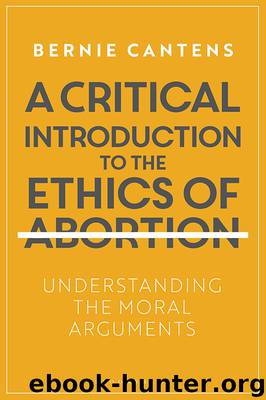A Critical Introduction to the Ethics of Abortion by Cantens Bernie

Author:Cantens, Bernie
Language: eng
Format: epub
Publisher: Bloomsbury UK
Summary
In this chapter, we analysed and studied Thomson’s violinist analogy and her view that even if the foetus is considered a person with a right to life, it is not always the case that it is morally impermissible to have an abortion. In fact, she argues, if a woman has not given implicit or explicit consent to the use of her body, then she does not commit an injustice against the foetus/person if she decides to detach herself from him or her. According to Thomson, the foetus/person does not have a right to use the pregnant woman’s body, and therefore she does not violate the foetus’s rights when she has an abortion.
We examined seven objections to Thomson’s view: (1) the objection from non-rape cases as consent; (2) the objection from third-party interference; (3) the objection from minimal sacrifice principle; (4) the objection from the special relationship between the pregnant woman and the foetus; (5) the objection that justice does not always require consent; (6) the objection from Minimally Decent and Good Samaritan principles; and (7) the objection based on the distinction between saving and killing the foetus. In summary, some of these objections seem to create challenges that need to be explored further. First, there are difficulties with the view that all moral obligations have to be voluntary and assume some form of consent. Can’t there be situations in which a person has not consented to care for another but is obliged to? Consider the case of the father who never consents to having a child, and yet he is held responsible for the care of the child. If you find a dying infant in a dumpster, are you morally obligated to care for it until you can give the infant to the proper authorities? If an agent can prevent a great evil from occurring, and he needs to sacrifice very little to do so, does the agent have a moral obligation to perform the act, even if the agent has not consented to the situation that brought about the moral obligation? It seems that some people’s moral intuitions about such cases will be very different from Thomson’s. In these cases, some people will find that an agent has a moral duty to prevent a person from suffering, even if the suffering person has no right against the agent. Moreover, the agent commits a grave injustice if he does not perform the act.
Thomson seems to be aware of this tension; for according to her view, there can be cases in which a person ought to perform a certain action even though he or she does not commit an injustice in not performing it. This seems paradoxical. For instance, according to Thomson, it might be the case that Henry Fonda ought to touch the dying person on their forehead if doing so would save his or her life, and it requires minimal sacrifice on the part of Henry Fonda. This ought seems to be a moral or virtuous ought and not one that concerns justice.
Download
This site does not store any files on its server. We only index and link to content provided by other sites. Please contact the content providers to delete copyright contents if any and email us, we'll remove relevant links or contents immediately.
The Lost Art of Listening by Michael P. Nichols(7494)
Why I Am Not A Calvinist by Dr. Peter S. Ruckman(4148)
The Rosicrucians by Christopher McIntosh(3510)
Wicca: a guide for the solitary practitioner by Scott Cunningham(3167)
Signature in the Cell: DNA and the Evidence for Intelligent Design by Stephen C. Meyer(3130)
Real Sex by Lauren F. Winner(3014)
The Holy Spirit by Billy Graham(2944)
To Light a Sacred Flame by Silver RavenWolf(2814)
The End of Faith by Sam Harris(2733)
The Gnostic Gospels by Pagels Elaine(2527)
Waking Up by Sam Harris(2454)
Nine Parts of Desire by Geraldine Brooks(2360)
Jesus by Paul Johnson(2352)
Devil, The by Almond Philip C(2324)
The God delusion by Richard Dawkins(2305)
Heavens on Earth by Michael Shermer(2278)
Kundalini by Gopi Krishna(2180)
Chosen by God by R. C. Sproul(2161)
The Nature of Consciousness by Rupert Spira(2104)
